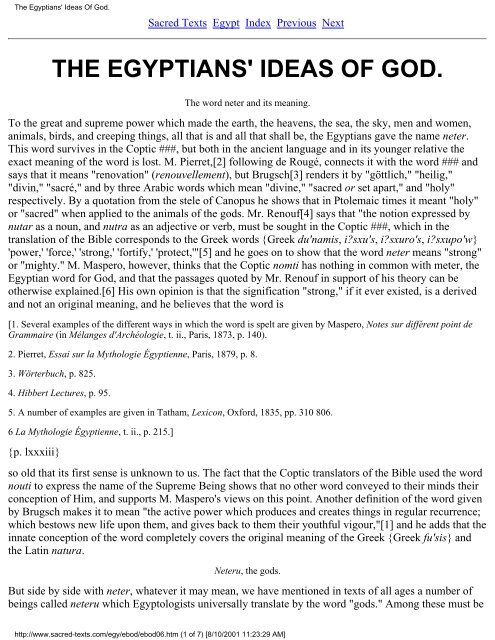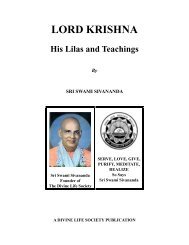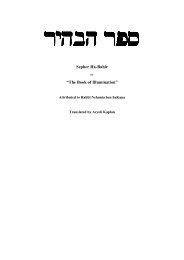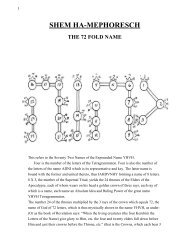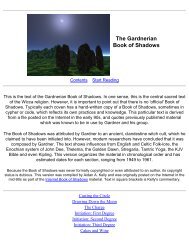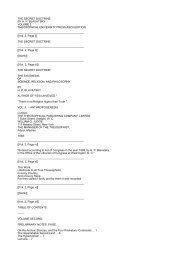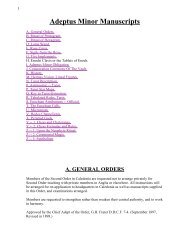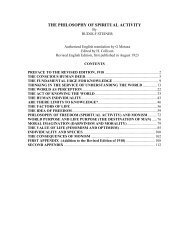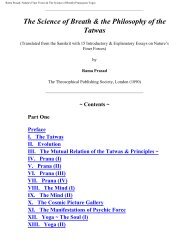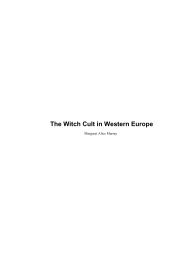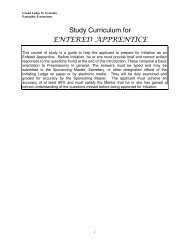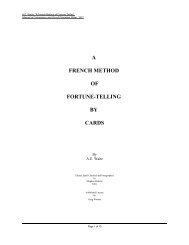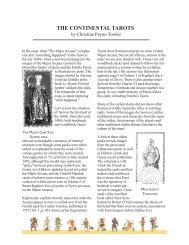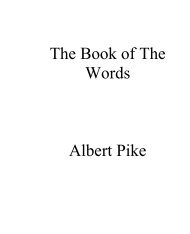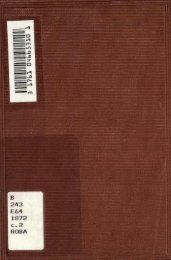Create successful ePaper yourself
Turn your PDF publications into a flip-book with our unique Google optimized e-Paper software.
The Egyptians' Ideas Of God.<br />
Sacred Texts Egypt Index Previous Next<br />
THE EGYPTIANS' IDEAS OF GOD.<br />
The word neter and its meaning.<br />
To <strong>the</strong> great and supreme power which made <strong>the</strong> earth, <strong>the</strong> heavens, <strong>the</strong> sea, <strong>the</strong> sky, men and women,<br />
animals, birds, and creeping things, all that is and all that shall be, <strong>the</strong> Egyptians gave <strong>the</strong> name neter.<br />
This word survives in <strong>the</strong> Coptic ###, but both in <strong>the</strong> ancient language and in its younger relative <strong>the</strong><br />
exact meaning <strong>of</strong> <strong>the</strong> word is lost. M. Pierret,[2] following de Rougé, connects it with <strong>the</strong> word ### and<br />
says that it means "renovation" (renouvellement), but Brugsch[3] renders it by "göttlich," "heilig,"<br />
"divin," "sacré," and by three Arabic words which mean "divine," "sacred or set apart," and "holy"<br />
respectively. By a quotation from <strong>the</strong> stele <strong>of</strong> Canopus he shows that in Ptolemaic times it meant "holy"<br />
or "sacred" when applied to <strong>the</strong> animals <strong>of</strong> <strong>the</strong> gods. Mr. Renouf[4] says that "<strong>the</strong> notion expressed by<br />
nutar as a noun, and nutra as an adjective or verb, must be sought in <strong>the</strong> Coptic ###, which in <strong>the</strong><br />
translation <strong>of</strong> <strong>the</strong> Bible corresponds to <strong>the</strong> Greek words {Greek du'namis, i?sxu's, i?sxuro's, i?sxupo'w}<br />
'power,' 'force,' 'strong,' 'fortify,' 'protect,'"[5] and he goes on to show that <strong>the</strong> word neter means "strong"<br />
or "mighty." M. Maspero, however, thinks that <strong>the</strong> Coptic nomti has nothing in common with meter, <strong>the</strong><br />
Egyptian word for God, and that <strong>the</strong> passages quoted by Mr. Renouf in support <strong>of</strong> his <strong>the</strong>ory can be<br />
o<strong>the</strong>rwise explained.[6] His own opinion is that <strong>the</strong> signification "strong," if it ever existed, is a derived<br />
and not an original meaning, and he believes that <strong>the</strong> word is<br />
[1. Several examples <strong>of</strong> <strong>the</strong> different ways in which <strong>the</strong> word is spelt are given by Maspero, Notes sur différent point de<br />
Grammaire (in Mélanges d'Archéologie, t. ii., Paris, 1873, p. 140).<br />
2. Pierret, Essai sur la Mythologie Égyptienne, Paris, 1879, p. 8.<br />
3. Wörterbuch, p. 825.<br />
4. Hibbert Lectures, p. 95.<br />
5. A number <strong>of</strong> examples are given in Tatham, Lexicon, Oxford, 1835, pp. 310 806.<br />
6 La Mythologie Égyptienne, t. ii., p. 215.]<br />
{p. lxxxiii}<br />
so old that its first sense is unknown to us. The fact that <strong>the</strong> Coptic translators <strong>of</strong> <strong>the</strong> Bible used <strong>the</strong> word<br />
nouti to express <strong>the</strong> name <strong>of</strong> <strong>the</strong> Supreme Being shows that no o<strong>the</strong>r word conveyed to <strong>the</strong>ir minds <strong>the</strong>ir<br />
conception <strong>of</strong> Him, and supports M. Maspero's views on this point. Ano<strong>the</strong>r definition <strong>of</strong> <strong>the</strong> word given<br />
by Brugsch makes it to mean "<strong>the</strong> active power which produces and creates things in regular recurrence;<br />
which bestows new life upon <strong>the</strong>m, and gives back to <strong>the</strong>m <strong>the</strong>ir youthful vigour,"[1] and he adds that <strong>the</strong><br />
innate conception <strong>of</strong> <strong>the</strong> word completely covers <strong>the</strong> original meaning <strong>of</strong> <strong>the</strong> Greek {Greek fu'sis} and<br />
<strong>the</strong> Latin natura.<br />
Neteru, <strong>the</strong> gods.<br />
But side by side with neter, whatever it may mean, we have mentioned in texts <strong>of</strong> all ages a number <strong>of</strong><br />
beings called neteru which Egyptologists universally translate by <strong>the</strong> word "gods." Among <strong>the</strong>se must be<br />
http://www.sacred-texts.com/egy/ebod/ebod06.htm (1 <strong>of</strong> 7) [8/10/2001 11:23:29 AM]


